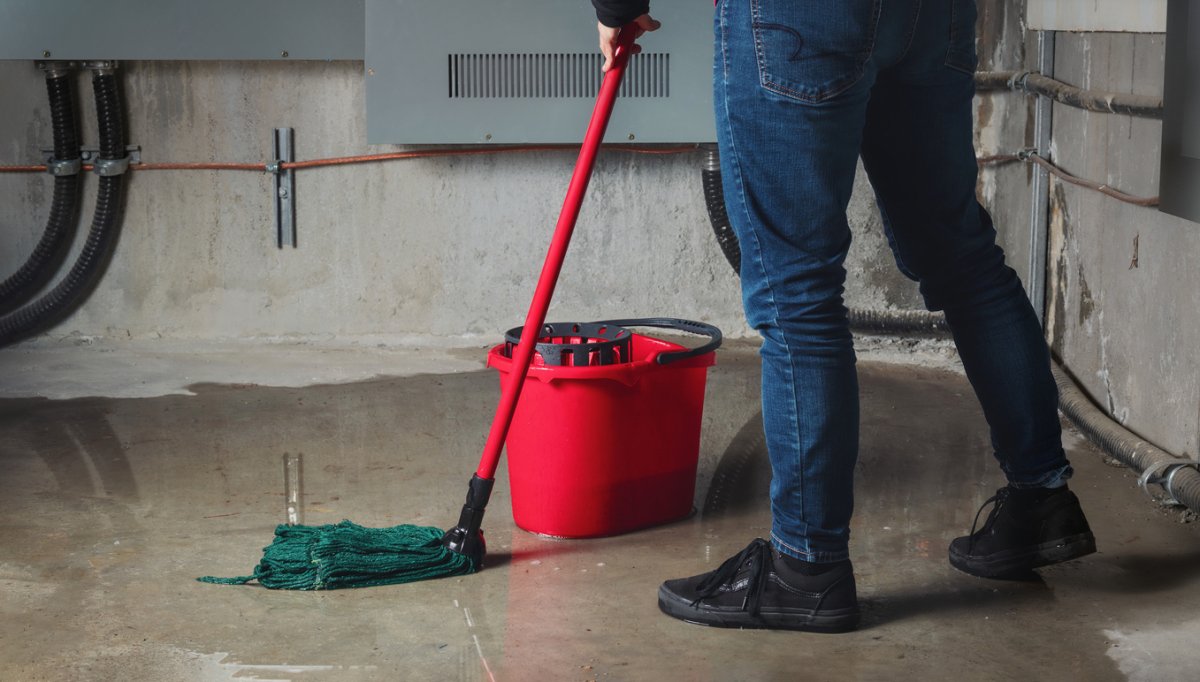

We may earn revenue from the products available on this page and participate in affiliate programs. Learn More ›
Q: After heavy rainfall yesterday, I noticed water seeping through my basement floor. I removed the water and dried my floors, but the water is back today. What should I do to fix the issue and prevent it from happening again?
A: Water in the basement is no small problem, so it makes sense that discovering this phenomenon would raise some concerns. There are a number of things homeowners can do to find out why water is coming up through the floor in their basement. For starters, it’s a good idea to inspect the plumbing in or around the basement to see if a pipe is leaking or cracked. It may be necessary to hire a plumber for this part. Homeowners can also check for foundation cracks or improper grading on the exterior of the home, as these situations can also lead to seepage. While the issues that can cause water seepage in the basement are many and varied, they all require urgent action on the part of the homeowner to prevent mold and water damage from taking hold. Tim Tracy is a sales trainer at Groundworks, a foundation services company based in Virginia Beach, Virginia. He says, “In addition to damaging your carpet and other belongings, a wet basement can also bring health concerns and extreme foundation damage if left untreated.” He goes on to say that while all issues related to the foundation are valid, “if you’re having foundation concerns due to basement water problems, that means you’re having foundation problems because of something you could fix.” At the first sign of basement moisture issues, homeowners will want to start troubleshooting this problem so that they can identify the right professional to remedy it.
Blocked or damaged drain lines are among the most common reasons for water seeping through a basement floor.
When floor drains or perimeter drains become clogged with debris, sediment, or tree roots, they’re no longer able to carry water away from the basement. If this is the case, homeowners may notice water coming up from basement floor drains and pooling on the floor. There are a number of signs that point to blocked or damaged drain lines, including:
- Water backup
- Slow drainage
- Foul smells
- Gurgling sounds
- Backflow or overflow
- Visible mold
If any of these signs of drainage issues are present, it’s recommended that the problem be addressed as soon as possible. Depending on the severity of the issue, it may be necessary to contact one of the best plumbing services (such as Mr. Rooter or Roto-Rooter) to assess and repair the drain lines. Snaking a drain costs between $145 and $350 on average, and this process can remove any blockages that could be backing up the drain. However, if the drain has collapsed, the repair may be more costly. Regular maintenance and inspections of the drainage system can help prevent these problems from happening again and causing more damage in the basement.
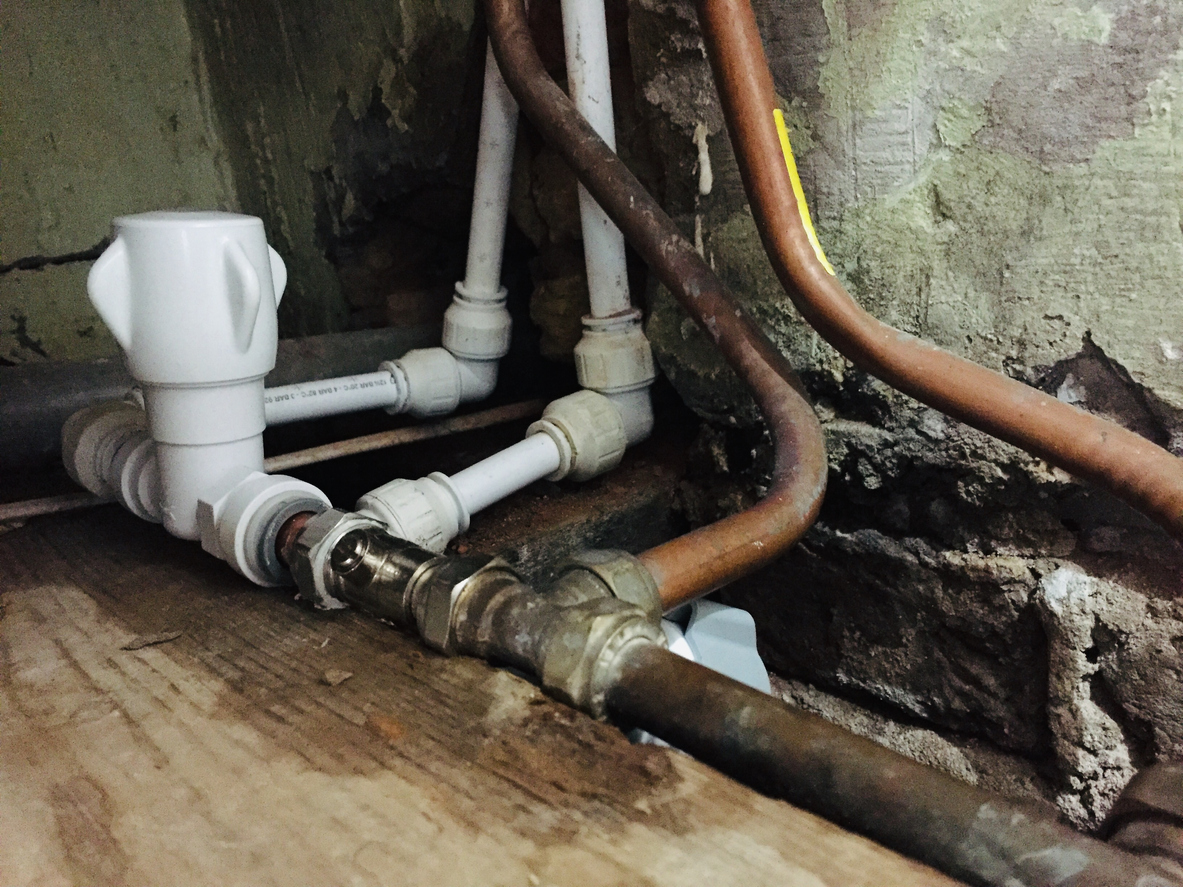
Leaks or condensation from water supply pipes that run through the basement are another potential culprit.
Over time, water supply pipes can develop small leaks or pinhole openings due to corrosion, wear, or other factors. If these pipes run underneath the basement and develop small leaks, it can lead to water leaks in the basement floor. In some cases, cold water supply pipes in a basement can develop condensation on their exterior surfaces when warm, humid air from the basement comes into contact with the cooler pipes. This condensation can lead to moisture buildup in the surrounding area, potentially causing water damage if it’s not properly managed. If pipes are indeed the culprit, it’s a good idea to hire a local plumber to fix the leak. After the pipe is fixed, homeowners can take some additional measures to prevent the leaks from happening again, such as:
- Having the water supply pipes regularly inspected by a professional for visible leaks or signs of moisture;
- Insulating cold water supply pipes to reduce condensation;
- Implementing proper ventilation to reduce humidity levels in the basement, reducing the potential for condensation on pipes; and
- Sealing the foundation and waterproofing basement walls and floors to prevent condensation on pipes from entering through cracks or gaps.
It’s also a good idea to check for cracks in the home’s foundation as these can be another source of water leaks.
Rainwater can accumulate in the soil around the foundation and eventually find its way into the basement through cracks, joints, or porous materials. Homeowners will want to check the exterior of the foundation and the basement’s interior walls for cracks. While small hairline fissures are probably not cause for concern, large cracks in basement walls may need attention. If there is a major crack in the foundation, one of the best foundation repair companies (Basement Systems and Ram Jack are top companies) can seal it using an epoxy injection, which helps prevent water from entering through these openings.
It’s worth noting that small cracks on the basement floor most likely aren’t an indication of a bigger foundation problem. But if the cracked part of the floor appears to be heaving upward, this is a sign that an immense amount of pressure is building up beneath the basement floor, which is a problem that will need to be urgently addressed by a foundation specialist.
Even if there are no foundation cracks, excess groundwater around the base of the home can cause water to seep into the basement due to hydrostatic pressure.
Another reason to check for the presence of water-saturated soil around the foundation is that it can create something called hydrostatic pressure. According to Tracy, “Hydrostatic pressure refers to the weight of the water surrounding your basement walls. The water will push on the walls, causing them to crack and bow inward.” As this pressure builds up in the soil surrounding the foundation, it will also force water to seep through any porous surfaces. While it may not seem porous, concrete is actually full of microscopic holes where it is possible for water to pass through. It is this process that professionals are referring to when using the term “seepage.” Water leakage is a more sudden or substantial release of water through a larger gap or crack. If a homeowner notices that there is water on the floor but no leaks are visible, this excess moisture is likely the result of seepage from hydrostatic pressure. Depending on whether a homeowner is dealing with leaking or seepage, water infiltration in the basement is serious as it can lead to harmful mold or mildew growth as well as foundation issues.
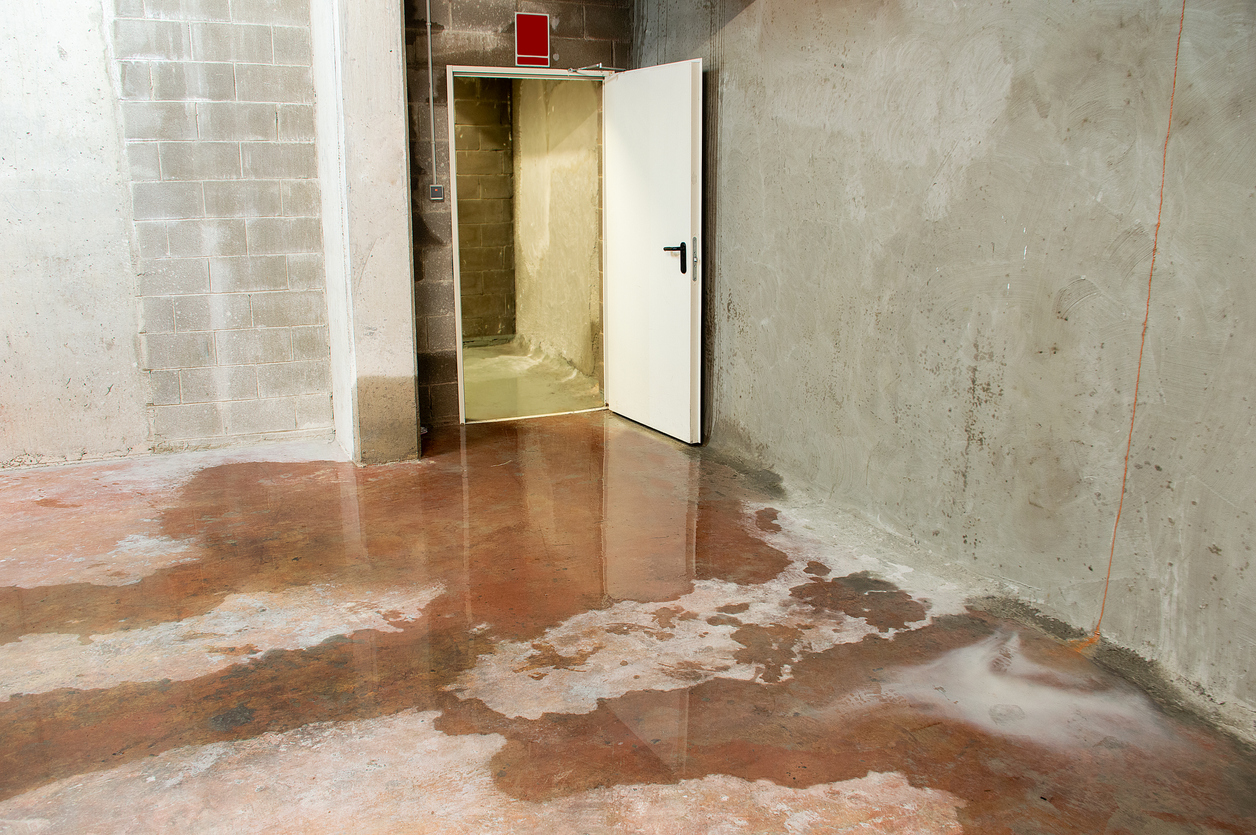
The presence of excess groundwater could be the result of poor landscape grading.
Proper grading is essential for managing rainwater and groundwater, ensuring that it flows away from the foundation and doesn’t accumulate near the building. When landscape grading is inadequate or improperly done, it can result in issues such as excess groundwater around the exterior of the home and lead to water coming up from the floor. A homeowner or one of the best landscaping companies (consider TruGreen) can correct poor grading by making sure the lawn slopes away from the home’s foundation. It’s also worth considering putting in French drains, extending downspouts, or installing a sump pump to help manage excess water.
Water from overflowing gutters can also oversaturate the soil surrounding the home.
Gutters are an essential part of a house’s drainage system since they are designed to collect rainwater and direct it away from the foundation. When clogged gutters or gutters that are damaged overflow, it can lead to a leaking basement as well as drainage problems in the yard. By addressing overflowing gutters and taking steps to manage water around the foundation, it is possible for homeowners to reduce the risk of soil oversaturation, foundation damage, and water seeping through concrete floors or walls. Regular maintenance and proactive measures are key to ensuring the home’s gutter system continues to work properly, such as:
- Periodically cleaning gutters or hiring one of the best gutter cleaning services such as Window Genie to remove debris such as leaves, twigs, and dirt;
- Making sure the downspouts are clear and properly channel water away from the foundation; and
- Having gutters regularly inspected for damage that could lead to leaks.
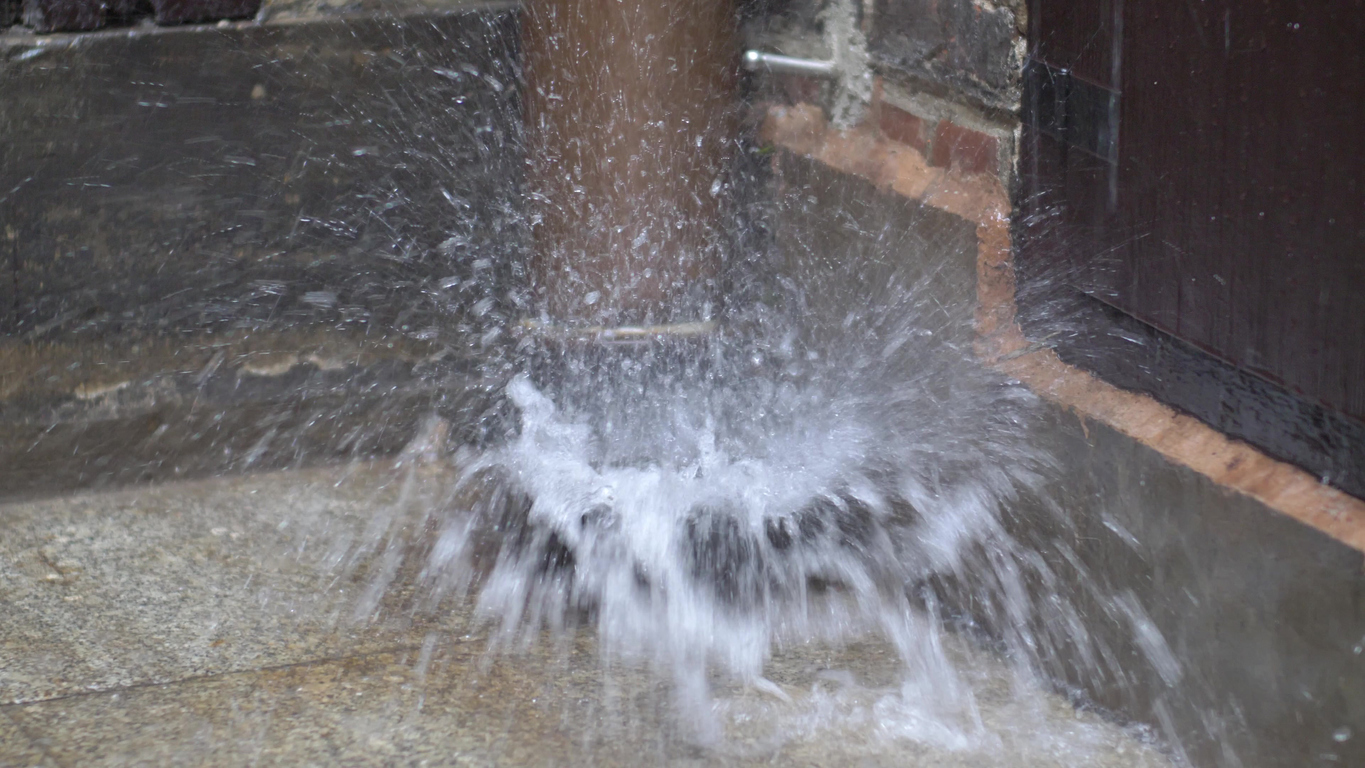
For those who find it difficult to keep up with gutter cleaning, it may also be worth having a gutter guard system installed. Gutter guards cost $615 to $2,348 on average and can greatly reduce debris buildup in a gutter system, making the need for gutter cleaning much less frequent.
Lastly, insufficient basement waterproofing can result in ongoing water issues in the basement.
When a basement lacks a proper moisture barrier or waterproofing, it becomes vulnerable to water seeping up from the ground, particularly during periods of heavy rain, snowmelt, or high groundwater levels. This can lead to recurring water seepage or even flooding. Luckily, there are a number of basement waterproofing techniques that a professional can put in place to prevent future occurrences of a wet basement floor or water seeping through the foundation slab, such as:
- Putting an interior drain tile system in place;
- Putting an exterior drain tile system in place;
- Having roll-on sealant applied;
- Installing a vapor barrier; or
- Installing a sump pump (or repairing a broken sump pump)
While basement waterproofing costs can range from $2,300 to $7,575 depending on the methods that are implemented, having this service done will protect the home from future costly damage.
A basement waterproofing company can identify the cause of water seeping through the basement floor and recommend the best solution.
Water seepage in the basement is a serious problem, whether it occurs a few times a year or every other week. Unresolved leaks or cracks can cause moisture to build up and encourage mold growth while also wreaking havoc on the home’s flooring and subfloor. “If a homeowner sees a wet basement floor after a weather event, musty smells throughout the home, wet drywall, or window condensation, they need to call a waterproofing professional,” Tracy advises.
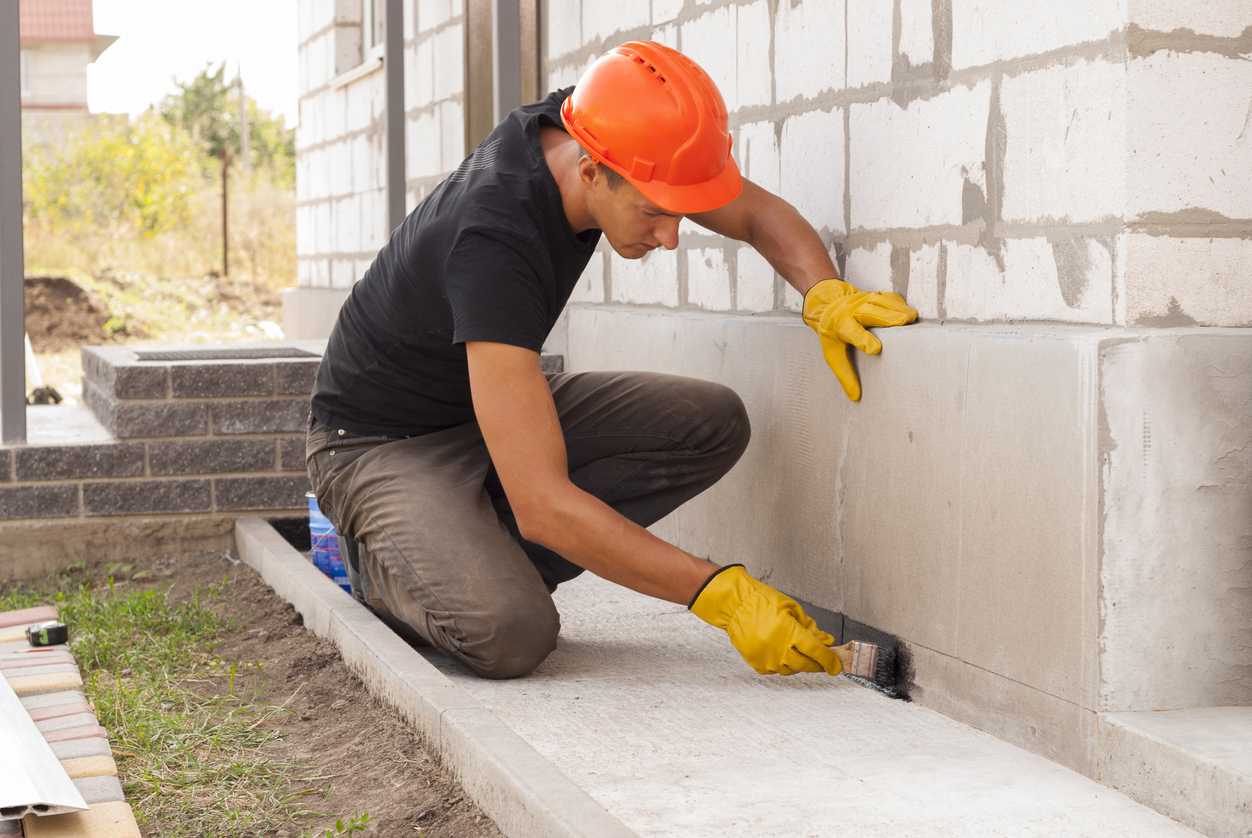
Fortunately, water seeping through the basement floor is not a solutionless problem. One of the best basement waterproofing companies, such as Basement Systems or B-Dry, can identify how the water is getting in, and then help the homeowner make a decision about what basement waterproofing methods will be implemented. If water coming up through the basement floor after heavy rain is caused by hydrostatic pressure from exterior water buildup, a professional will likely suggest putting in an exterior drain tile system or French drain. If there are basement leaks where the wall meets the floor, a waterproofing professional may seal cracks by applying a waterproof coat of paint on the flooring to create a water-resistant barrier. They may also lay down a vapor barrier or moisture-resistant underlayment on top of the basement floor to prevent moisture from permeating through the concrete.
If there has been significant flooding, a water damage restoration service can clean up the basement to prevent mold growth and structural damage.
Homeowners may still be wondering when a wet basement is cause for concern, and at what point the problem becomes severe. When water has flooded the basement, seeped into the walls, or is permeating the area repeatedly, it’s a good idea to take action. According to the Environmental Protection Agency (EPA), mold can develop in as little as 24 to 48 hours after water damage occurs. Mold growth in the basement has the potential to cause adverse health effects for those living in the home. Water seepage in the basement can also lead to structural damage such as warped drywall, wood rot, and foundation cracks. For these reasons, it’s a good idea to get in touch with one of the best water damage restoration services, such as ServiceMaster Restore or ServPro, soon after the damage occurs. Flooded basement cleanup by one of these services can include removing any sign of water, drying out the space, removing flooring or drywall, treating for mold, and repairing the damage so that the basement is like new.
